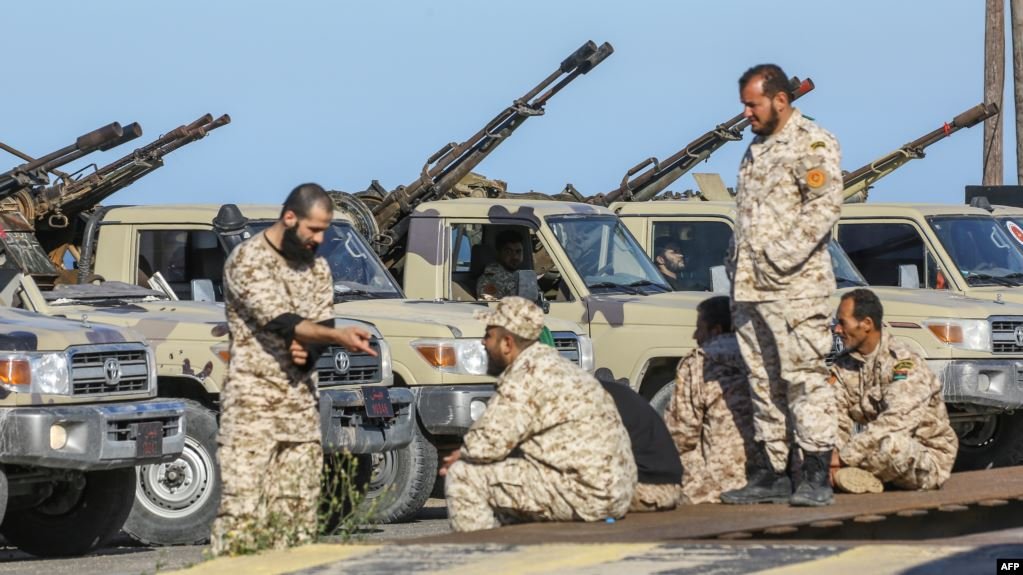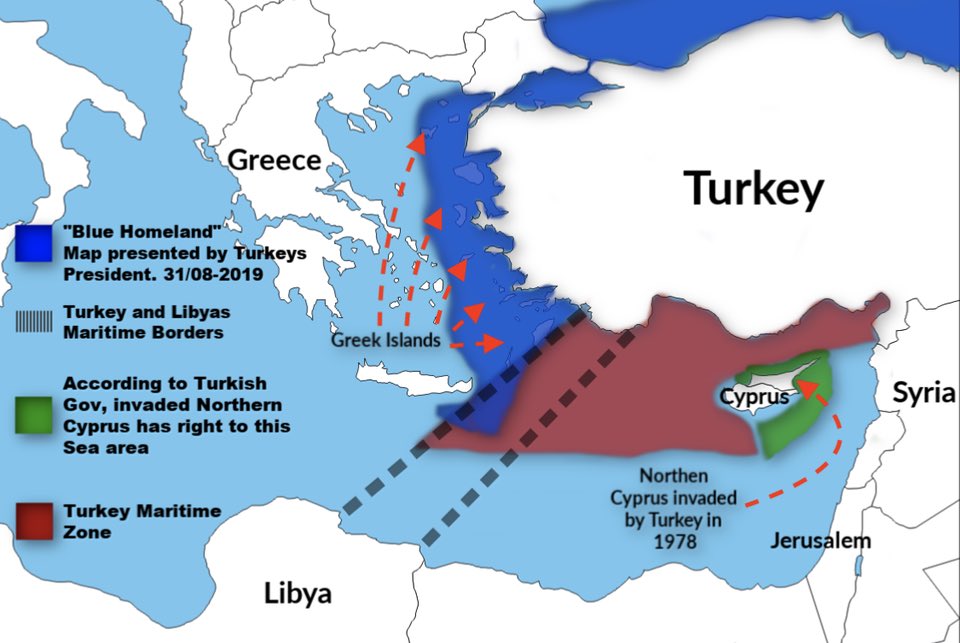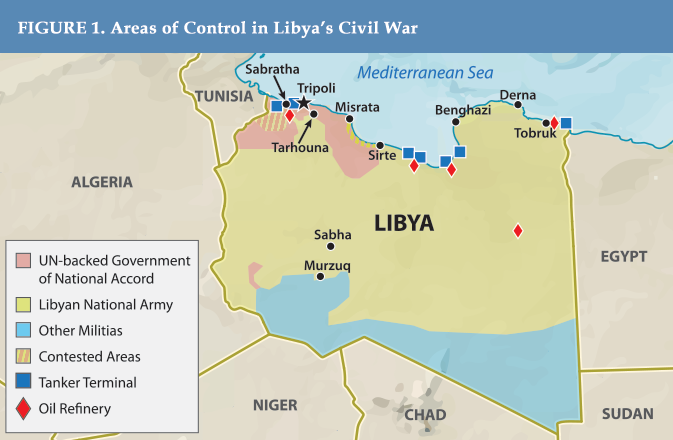 Actors and Balance of Power in Libya
Actors and Balance of Power in Libya
After Gaddafi was overthrown in 2011, Libya was plunged into chaos and political instability. Since 2014, there have been two separate government-controlled regions in Libya. The first of these is the Government of National Accord (GNA), led by Fayez al-Sarraj, based in Tripoli, which is accepted as the legitimate representative by the UN. The second is the Libyan National Army (LNA) forces under Tobruk-based general Khalifa Haftar. Haftar forces' control of oil resources in Libya is important in terms of power balances. Haftar forces are support by France, Saudi Arabia, Egypt, UAE and Russia. The Government of National Accord is support by Turkey, Italy and Qatar. Turkey has recognizes 17 February 2011 the Government of National Accord as Libya's sole representative. He became the first country to appoint an ambassador to Tripoli on September 2, 2011. Turkey increased its military support to the Sarraj administration through the "Delimitation of Maritime Jurisdictions" and "Security and Military Cooperation" agreement signed with the Government of National Accord on November 27, 2019.[1] The new air defense systems deployed to Libya opened the way for extensive and intense airstrikes by Turkish armed unmanned aerial vehicles (SIHA). This paralyzed the UAE's own unmanned aerial vehicle (UAV) operations with Hafter's resupply facilities. The GNA, which regained control of the western coastline between the Tunisian border and Tripoli, also recaptured Vatiyye airbase, the second most important military base in the country, which Haftar had exploited in the attack on Tripoli, and the town of Tarhuna in the south of Tripoli.

Egypt, which also supports the LNA, has threatened to send troops to Libya if GNA and Turkish forces try to capture Sirte. The Egyptian parliament gave the green light to military intervention in Libya on 20 July. Egypt is troubled by militants who may come across the border from Libya. In addition, Egypt is disturbed by Turkey's military presence in Libya. But the Egyptian parliament's support for Haftar forces is a bluff with a political message.
Russia has been supporting Haftar forces from the very beginning. There is a security company called Wagner (mercenary) as Russian proxy forces that are not actively present in the field. Russia's goal focuses more on its interests in the Mediterranean than on natural resources in Libya. It carries out the policy of preserving the old alliance relations during the Gaddafi period and acquiring a base in the Mediterranean.

Turkey's Goal Is To Protect Its Gains In The Eastern Mediterranean
First of all, let's talk about the historical ties between Turkey and Libya based on the past. The Ottoman Empire took over the administration in the region in 1553. The Ottoman State ruled Libya until 1911. With the weakening of the Ottoman Empire, Italy started to occupy in 1911. The Ottoman State could not send support to the region due to its military weakness. Instead, important military commanders who would organize local people's resistance were secretly sent to the region. The most important officers of the Ottoman Empire took part in the Libyan resistance. Republic of Turkey's founder Mustafa Kemal Ataturk and Enver Pasha, chief of staff of the First World War, were in the war in Libya. As the Balkan wars began, the Ottoman Empire had to recognize Italy's dominance in Libya by the Treaty of Ouchy. However, the popular resistance in Libya continued under the leadership of Omar Al-Mukhtār until 1931. Libya gained its independence in 1951. Turkey has maintained relations after Libya's independence. Turkey recognized and supported the Sarraj administration after the civil war in 2011. After the November 27 security and Cooperation Agreements, GNA troops have achieved significant gains on land with the support of Turkey's.
Turkey does not have an interest in Libyan territory. Turkey's only interest in Libya is to ensure the survival of the Eastern Mediterranean Exclusive Economic Zone (EEZ) Agreement it signed with the GNA. Because of the Sarraj administration disappears, the signed agreement will become invalid.
With the discovery of natural resources in the Eastern Mediterranean in 2010, there was a dispute over the Exclusive Economic Zone in the region. There have dispute zones between Greece and Turkey in the Eastern Mediterranean. Thanks to the agreement signed by Turkey with the GNA it protects sovereign rights in the eastern Mediterranean in the international arena. After the agreement signed between the two countries, Turkey has accelerated its natural gas exploration activities in the Eastern Mediterranean. Greece and Egypt signed an agreement establishing their maritime borders on August 6th after Turkey signed Delimitation of Maritime Jurisdictions agreement with the GNA. This is a dimension of the Eastern Mediterranean struggle between Turkey and Greece.
Turkey signed an agreement with the GNA that gave to action Greece and raised tensions in the Eastern Mediterranean. According to the Greek-Egyptian agreement, although Turkey has long coasts in the Mediterranean, it is desirable to be limited into the Port of Antalya. The Meis Island is the disputed territory between Turkey and Greece that limits its maritime powers. Greece's claim is that the island of Meis should be given the Exclusive Economic Zone. But Meis Island is just 3 kilometers away from Turkey. The island of Meis is 580 kilometers away from the Greek mainland. On the other hand, according to the Exclusive Economic Zone agreement signed between Greece and Italy in July 2020, Greece signed an agreement based on the mainland instead of the islands. With this agreement, Greece also contradicts its claim in the Eastern Mediterranean. Turkey sent its seismic research vessel, Oruç Reis, to the region on 10 August, taking into account the limits of the agreement it signed with the GNA government. Thus, Turkey has stated that it is actively in the field and that the Greek-Egyptian agreement has no effect.

Blue Homeland Strategy
Turkey's policy in Libya and the Eastern Mediterranean sits on a strategic basis. Turkey's recent exert Blue Homeland strategy in the Eastern Mediterranean. What is the Blue Homeland Strategy? Admiral Cem Gürdeniz first used this concept in 2006. Turkey is a country surrounded by sea on three sides by the sea. Although Turkey is surrounded on three sides by the seas, it has not been able to use its maritime capabilities. The defense of the homeland should start from the maritime borders and Turkey should give importance to maritime. Because sea borders is also a part of the homeland and must be defended. Cem Gürdeniz to the borders of the sea which is the continuation of Turkey's land border '' Blue Homeland 'has been called. In short, Turkey's maritime border and sovereignty rights protection strategy.
The Blue Homeland strategy was introduced in 2006, but was not implemented. The most important reason for this was the Ergenekon and Balyoz operations that started in 2007. Because the FETO[2] soldiers in Turkey purged Kemalist and Eurasianist officers within the army and Navy.[3] Cem Gürdeniz, who set out the strategy of the Blue homeland, was among the officers tried in the Balyoz case. With the end of the Ergenekon case and the purge of the FETO within the state, the Blue Homeland doctrine implemented. On May 19, 2015, the Turkish Naval Forces Strategy document was published. The title of this document had been ‘To Be Safe at Homeland for To Be Strong at Sea; To Have a Say in the World for To Exist in All Seas’. According to the document, the changing international hegemony was evaluated and the development of the naval forces and the protection of Turkey's interests and rights in the seas were set out as a strategy.[4] In short, Turkey has entered a period of active protection of national interests on the Blue Homeland strategies since 2015. Turkey's adoption of this strategy is related to the change in global power balances and Eurasianist orientation.

Behind the Scenes of All Conflicts in Libya: Eastern Mediterranean
The main strategies of all international actors in the Libyan conflict are based on establishing sovereignty in the Eastern Mediterranean. In this section we will discuss the power struggle of Turkey, France, Russia, Egypt and Greece over the Eastern Mediterranean. According to this strategy, international actors support one or another forces in Libya. At the same time, the opposition within the forces in the same alliance should be evaluated due to the national interests of the country.
Although Turkey, France and Italy are NATO member states, they do not act in a coordinated strategy. For example, France said he wanted to discuss Turkey's aggressive role in NATO.[5] But Turkey and Italy provides support Government of National Agreement (GNA) recognized by the UN. The GNA is fighting forces under the command of general Khalifa Haftar in eastern Libya. On the other hand, in May, NATO Secretary-General Stoltenberg stated that 'We are ready to support the GNA'.[6] As can be seen from here, there is no unity among NATO countries and there is confusion over the solution in Libya. The main reason for the disturbance between France and Turkey in Libya is the relationship between the EEZ borders in the Eastern Mediterranean. Because the Greek Cypriot Administration of Southern Cyprus (GCASC) gave the right to exploration and extraction of natural gas in the Eastern Mediterranean to international companies, including the French Total oil company. The agreement signed by Turkey with the GNA is damaging French interests in the Eastern Mediterranean. For this reason, France and Turkey support different parties in Libya. France has been trying to protect its interests in the Eastern Mediterranean by developing its relations with Greece and the GCASC. In July, President of France Emmanuel Macron asked the EU to impose sanctions on Turkey, arguing that Turkey had violated the Greece and GCASC continental shelf. At the same time, during Macron's visit to Beirut on 6 August, the rhetoric of ‘Lebanon must be a new political initiative’ and the slogans of ‘Long Live France help us‘ in the Christian district of Beirut illustrate France's strategy in the Eastern Mediterranean. On August 13, Macron wrote on his Twitter account that he would increase the military presence in the Eastern Mediterranean and shows France's attitude. (Macron wrote his tweet in Greek) French President Emanuel Macron had previously said that NATO was brain dead. It shows that the alliance is dead by not being able to act holistically with the fact that two NATO member countries are on different fronts.

While Russia indirectly supported Haftar forces through the Wagner group from the very beginning, it is seeking a political solution in Libya by negotiating with Sarraj. On January 13, 2020, Turkey and Russia held a Moscow summit to draft a political solution in Libya. The Sarraj administration signed the draft, while Haftar left Moscow without signing the deadline. Turkey and Russia, hosted by Germany, met at the table to resolve the Libyan problem by holding a Berlin Conference on January 19, 2020. However, despite attempts, no conclusions could be drawn. On June 3, 2020, GNA Deputy Prime Minister Ahmed Muaytik and Foreign Minister Muhammed El Tahrir Seyyale visited Moscow. Thus, Russia accepted the GNA as a high level. The meeting of the recently developed Turkish-Russian relations in common interests also increases the joint work. On 22 July, Turkey and Russia announced a joint working group for a ceasefire and a political solution in Libya.[7] In short, Russia wants to make gains in the Eastern Mediterranean by focusing on a solution in Libya together with Turkey, which is active in the field. Russia has achieved a significant gain by carrying out the Astana process with Turkey, which is active in the field in resolving the Syrian crisis. If Turkey and Russia, active in the field, can create a common mechanism for the solution of the Libyan problem, they will have gained. If Russia achieves this gain, it will take an active role in Libya after Syria and gain in the Mediterranean.
Conclusion
Turkey's military presence in Libya is based on two reasons. Turkey has a historical background with Libya and has an interest in the Eastern Mediterranean. Turkey will not give up its sovereignty rights in the Eastern Mediterranean by developing it's maritime Blue Homeland Strategy. Moreover, Turkey's cooperation with the GNA, which has been recognized by the UN, shows that it is pursuing the right strategy.
All actors who support the conflict parties in Libya are seeking to make gains in the Mediterranean. The action of Greece, Egypt and France in the Mediterranean after Turkey's agreement with the GNA confirm this determination. When France's attitudes towards Beirut, Libya and Greece are examined, attempts to establish dominance in the Mediterranean appear. Therefore, the solution effects in Libya will create new balances in the Mediterranean.
Considering the recent Turkish-Russian relations and the Blue Homeland Strategy, it seems likely that the actors of the political solution in Libya will be the Turkish-Russian duo. There are two forces in Libya that can solve the problem. It is Turkey that supports the GNA in the field and Russia that supports the Haftar Forces. Russia had a long alliance relationship in Libya during the Gaddafi period. As a result of this relationship, we can consider it as supporting the Haftar forces in Libya. Russia advocates for Libya to be ruled by Libyans. Russia doesn't want any damage to Russian interests in the Mediterranean. Turkey and Russia have common interests in the Mediterranean makes it possible to cooperate. The Syria crisis has eased thanks to the Astana process led by Russia and Turkey. Similar cooperation appears to be Moscow-Ankara cooperation aimed at achieving peace in Libya. To the extent that they focus on a solution between Turkey and Russia, there is a solution in Libya.
[1] http://www.mfa.gov.tr/turkiye-libya-siyasi-iliskileri.tr.mfa
[2] Fetullah Terrorist Organization (FETO): It is an Islamic terrorist organization infiltrated into the state. Its leader lives in the United States. On July 15, 2016, they organized a military coup to the government with its members within the Turkish Armed Forces and police.
[3] Cem Gürdeniz ‘Çelik Gemiler Demir Bahriyeliler’ Kırmızı Kedi Yayınevi, Birinci Basım, Temmuz 2016, İstanbul
[4] https://www.dzkk.tsk.tr/data/icerik/392/DZKK_STRATEJI.pdf
[5] https://www.reuters.com/article/us-libya-security-france-turkey/france-wants-talks-about-aggressive-turkish-role-in-libya-idUSKBN23M299
[6] https://www.aa.com.tr/en/europe/nato-ready-to-support-libyas-government-stoltenberg/1840871
[7] http://www.mfa.gov.tr/no_-156_-libya-konusunda-turk-rus-yuksek-duzeyli-istisareler-uzerine-ortak-aciklama-ankara-22-temmuz-2020.tr.mfa
 Copyright secured by Digiprove © 2020 Quixote Globe
Copyright secured by Digiprove © 2020 Quixote Globe